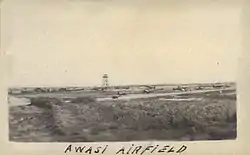Awase Airfield
Awase Airfield or NAB Awase is a former World War II airfield on the Pacific coast of Okinawa.
| Awase Airfield | |
|---|---|
| Okinawa, Ryukyu Islands, Japan | |
 | |
| Coordinates | 26°18′47.64″N 127°49′00.48″E |
| Type | Military Airfield |
| Site information | |
| Controlled by | United States Navy |
| Site history | |
| Built | April–June 1945 |
| Built by | Seebees |
| In use | 1945-50 |
| Materials | Coral |
| Garrison information | |
| Current commander | Melvin J. Maas |
History
World War II
The Awase area was captured during the first week of the Battle of Okinawa. The Awase area was surveyed for possible airbase construction in late April 1945 and the 36th Naval Construction Battalion commenced construction of a 5000 ft fighter airstrip there on 23 April. Construction of the airfield was delayed by torrential rain in late May and early June and the diversion of the heavy earth-moving equipment to the maintenance of supply roads. On 30 June 1945 the base was declared operational and the first aircraft from Marine Air Group 33 (MAG-33) landed at the airfield.[1]
Marine Aircraft Group 14 (MAG-14) comprising VMF-212, VMF-222 and VMF-223 all operating F4Us were based at Awase from July until September 1945.
VMF-312 operating F4Us was based at Awase from July to November 1945.
VMA-322 operating F4Us was based at Awase from July to November 1945.
VMF-323 operating F4Us transferred to Awase from Kadena on 15 July and remained there until the end of the war.
VMF(N)-543 operating F6F-3Ns night-fighters transferred to Awase from Kadena Airfield in July and remained there until the end of the war.
VMB-612's PBJ-1Ds were transferred to Awase in November 1945 when the unit was disestablished.[2]

Postwar
In 1950 both the US Navy and US Air Force constructed communications facilities here.
By March 1977 all of the airfield area had been returned to Japanese control other than the 0.552 km2 Awase Communication Station at the tip of the Awase peninsula. This base is responsible for communications with the United States Seventh Fleet, and all radio transmission of the U.S. Naval Forces in Okinawa.
See also
References
- Building the Navy's Bases in World War II History of the Bureau of Yards and Docks and the Civil Engineer Corps 1940-1946. US Government Printing Office. 1947. pp. 403–9.
 This article incorporates text from this source, which is in the public domain.
This article incorporates text from this source, which is in the public domain. - Scutts, Jerry (2003). PBJ Mitchell Units of the Pacific War. Osprey Publishing. p. 82. ISBN 9781841765815.